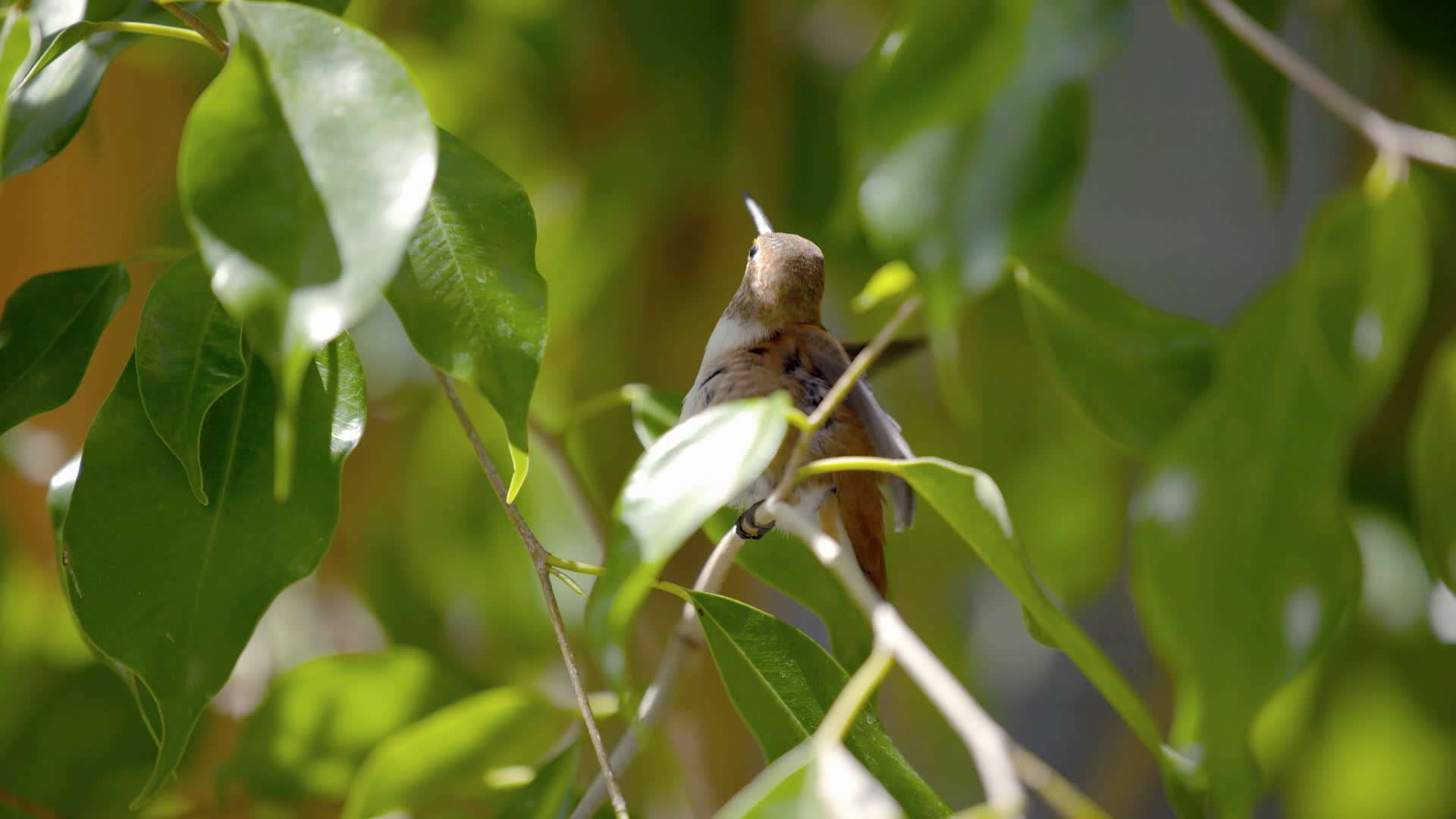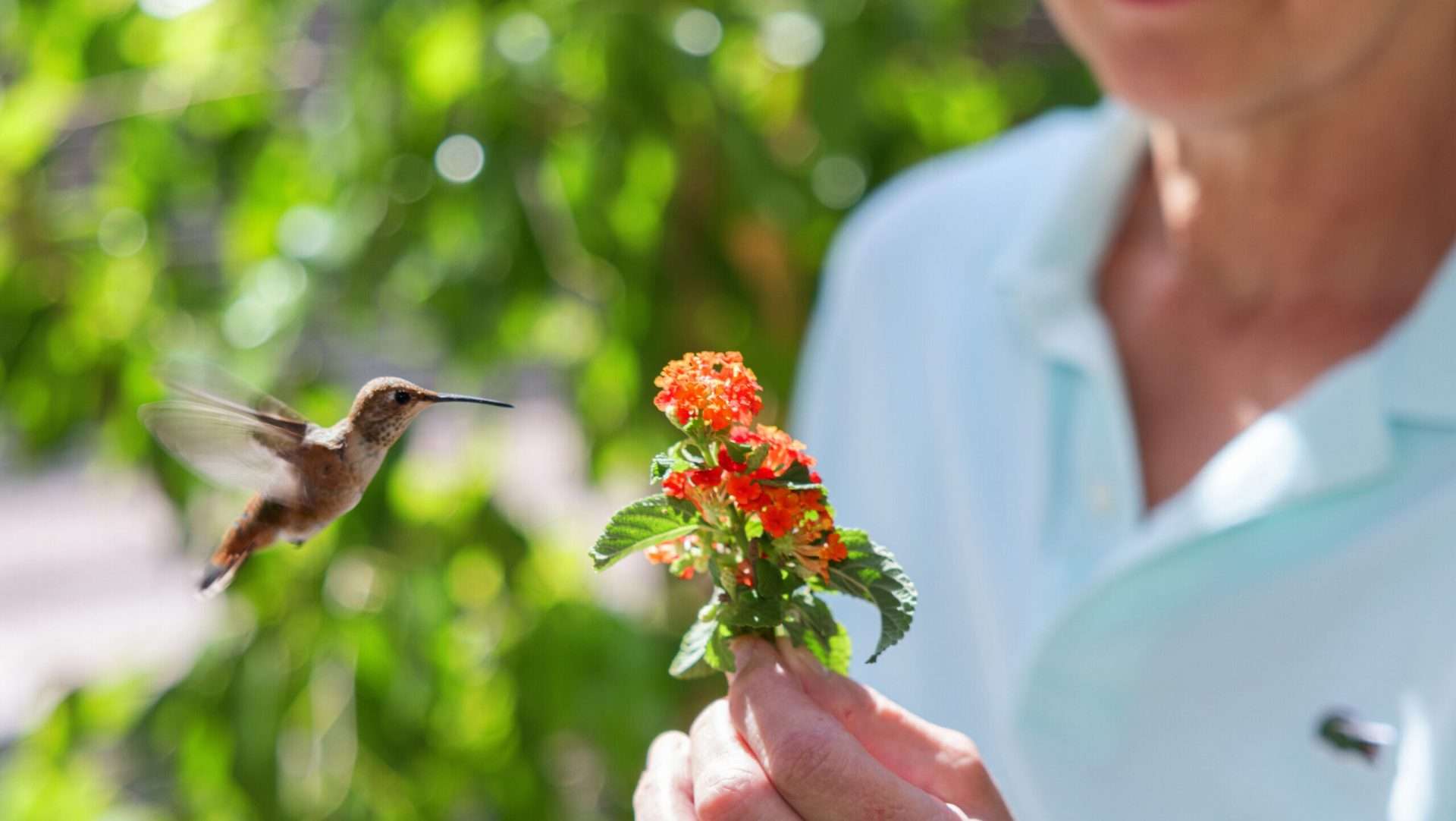There are no hummingbirds in England, but if there were, they surely would have replaced the falling apple as the mythic catalyst for Isaac Newton’s greatest ideas. Watching them suspended in mid-air as their wings beat faster than the human eye can see and being able to move in any direction within space, one realizes they perfectly illustrate the laws of motion governing our world. For that matter, maybe Charles Darwin wouldn’t have had to go all the way to the Galapagos to get his initial inspiration for evolution by natural selection as well.
Terry Masear would probably- very gently, of course- admonish me for speaking of these lovely little avians in such reductionist terms. She’s a born romantic who loves hummingbirds the way some people love cats and dogs, while others love horses, and the way my niece adores axolotls. She talks about the ones she cares for the way new parents talk about their newborn children, even giving them cute names such as Wasabi, Cactus, and Sugar Baby, and views them almost as a form of living poetry in motion. By the end of “Every Little Thing,” a beautifully filmed and sensitively made new documentary on Masear and her caring for these tiny birds, we’re regarding them in much the same way.
The makers of “Every Little Thing” were somehow able to convey Masear’s thoughts and feelings about hummingbirds in purely visual terms. Director Sally Aitken and her team of cinematographers used macrophotography and sped-up film, apparently in conjunction with drones in some shots, to capture these remarkable creatures in feeding and flight. Slowed down and in close-up, we’re finally able to see every flap and thrust of the individual wings, and how the slightest rotation enables their owners to move up and down, forward and backwards.

The wings in flight have a pattern and rhythm to them not unlike breathing or heartbeats, and equally remind us of the delicate mechanisms keeping every animal alive. The way the camera catches the sunlight breaking up on their iridescent feathers is equally gorgeous, and even their tongues are objects of wonder, extending seemingly as long as their own bodies to lap at the nectar that fuels their rapid flights. At times, when they stretched their necks and their overlapping feathers seemed more like reptilian scales, I was reminded that these smallest of birds are also kin to the sauropods that were the largest creatures to ever walk the earth. What strange and winding pathways evolution takes!
Most people are familiar with the ruby-throated hummingbird, the most common of all hummingbird species in North America and the only one found widely through the eastern half of the continent. The western half, however, is home to numerous different species, with at least nine of them living in or regularly migrating to California alone. Masear takes care of members of each in her household sanctuary, and as is the case with people, sometimes the different types mingle peacefully, sometimes they don’t, and sometimes they just don’t understand one another. One male becomes so fond of a female of another species that he makes a futile attempt at initiating a relationship. She not only resists his overtures but smacks him with a noisy whirl of her wings. This moment generated much laughter, mainly from females in the audience; I merely winced.
Some moments involving sick, injured, or even dying birds inspire sorrow instead. You may even find, as Masear often does, that the tears are mixed with anger. She doesn’t just give them their “cute” names out of endearment but as a reminder of the human folly that resulted in the need for rehabilitation. “Cactus” was so named because he landed in one that shouldn’t have been planted so close to the flowers he needs to survive and was badly wounded by its spines.
“Sugar Baby” received her monicker because she was drenched in sugar water by people who thought they were doing her a favor. Her sad situation particularly raises Terry’s ire, and she voices for us her overall indignation for those who fail to respect nature or ignorantly try to take matters into their own hands instead of consulting the experts and professionals. Even then, there’s more frustration than fury in her voice, more exasperation than wrath. Hatred is clearly not a word in her personal vocabulary.

It’s not just her Midwestern origins, being a transplant to Los Angeles from Southwestern Wisconsin, that accounts for this unusual, lukewarm-tempered reaction to what would enrage most of us. Most of what we learn about Terry Masear we see from her kind-hearted treatment of these fragile creatures, and the film fills in further clues about where that patience and compassion comes from. When she first describes her early life, it sounds outwardly normal, but then she speaks of many years of loneliness. She finally did fall in love with and marry someone, by her description an equally kind and empathetic man, a perfect match except that he was several years her senior. When he was diagnosed with Alzheimer’s, she became his sole caretaker, a task she performed not dutifully but out of love, up until the end of his life.
This, unfortunately, was not the only tragedy she had to deal with. She also speaks of the physical abuse she suffered as a child through adolescence that left her shy and introverted for many years. While she has finally found her voice, she still speaks in the muted tones of someone afraid to offend, as if she thinks even the kindest acquaintance might turn on her if she makes the mildest affront.
She doesn’t go into detail about it, but a brief mention of her mother lets us know of the main guilty party, and another mention of a hospital stay as a child tells us just how severe it was. After her wayward college years, in which she drank too much in an apparent attempt to drown away the painful memories, she finally pulled herself together, earned a PhD in English, and spent many years as a college instructor. Now retired and living alone, she devotes herself to rescuing and rehabilitating the hummingbirds of Los Angeles.
Ultimately, the title “Every Little Thing” refers not just to the diminutive hummingbirds Terry takes care of but to every other little thing in her life that led to her growing into the person she is now and all the little things that build each of us into the persons we are. It refers to every little thing we do to help and take care of others- human and otherwise. It is the name of basic kindness and charity, as well as of each ordinary person from every walk of life who makes even the tiniest effort at setting an example for the rest of us.
But it also refers to the negative things as well, the bad experiences that also mold us into who we are, the things we do sometimes without thinking that hurt others and sometimes to hurt ourselves as well. Some can recover, others cannot. It’s up to us not just to heal broken wings, but to be careful that they never break in the first place.





![The Story of Southern Islet [2021]: ‘Locarno’ Review – Malaysian ghost-tale conjures an enchanting spell](https://79468c92.delivery.rocketcdn.me/wp-content/uploads/2021/08/The-Story-of-Southern-Islet_6-768x512.jpeg)


